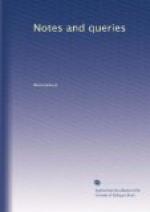There is a remarkable feature about these ancient “debentures” which I may perhaps be permitted to notice here, viz., the very beautiful seals of the officers of the royal household and wardrobe which are impressed upon them. They are of the somewhat rare description known as “applique;” and at a time when personal seals were at the highest state of artistic developement, those few seals of the clerks of the household which have escaped injury (to which they are particularly exposed) are unrivalled for their clearness of outline, design, delicacy, and beauty of execution.
Allowing for the changes produced by time, I think sufficient analogy may be found between the ancient and modern uses of the words “imprest” and “debenture.”
J. BT.
“Imprest” (Vol. ii., p. 40).—D.V.S. will find an illustration of the early application of this word to advances made by the Treasury in the “Rotulus de Prestito” of 12 John, printed by the Record Commission under the careful editorship of Mr. T. Duffus Hardy, whose preface contains a clear definition of its object, and an account of other existing rolls of the same character.
EDWARD FOSS.
Derivation of News.—P.C.S.S. has read with great interest the various observations on the derivation of the word “News” which have appeared in the “NOTES AND QUERIES,” and especially those of the learned and ingenious Mr. Hickson. He ventures, however, with all respect, to differ from the opinion expressed by that gentleman in Vol. i., p. 81., to the effect that—
“In English, there is no
process known by which a noun plural
can be formed from an adjective, without the previous
formation
of the singular in the same sense.”
P.C.S.S. would take the liberty of reminding Mr. H. of the following passage in the Tempest:—
“When
that is gone,
He shall drink nought but brine, for I’ll
not show him
Where the quick freshes lie.”
Surely, in this instance, the plural noun “freshes” is not formed from any such singular noun as “fresh,” but directly from the adjective, which latter does not seem to have been ever used as a singular noun.




